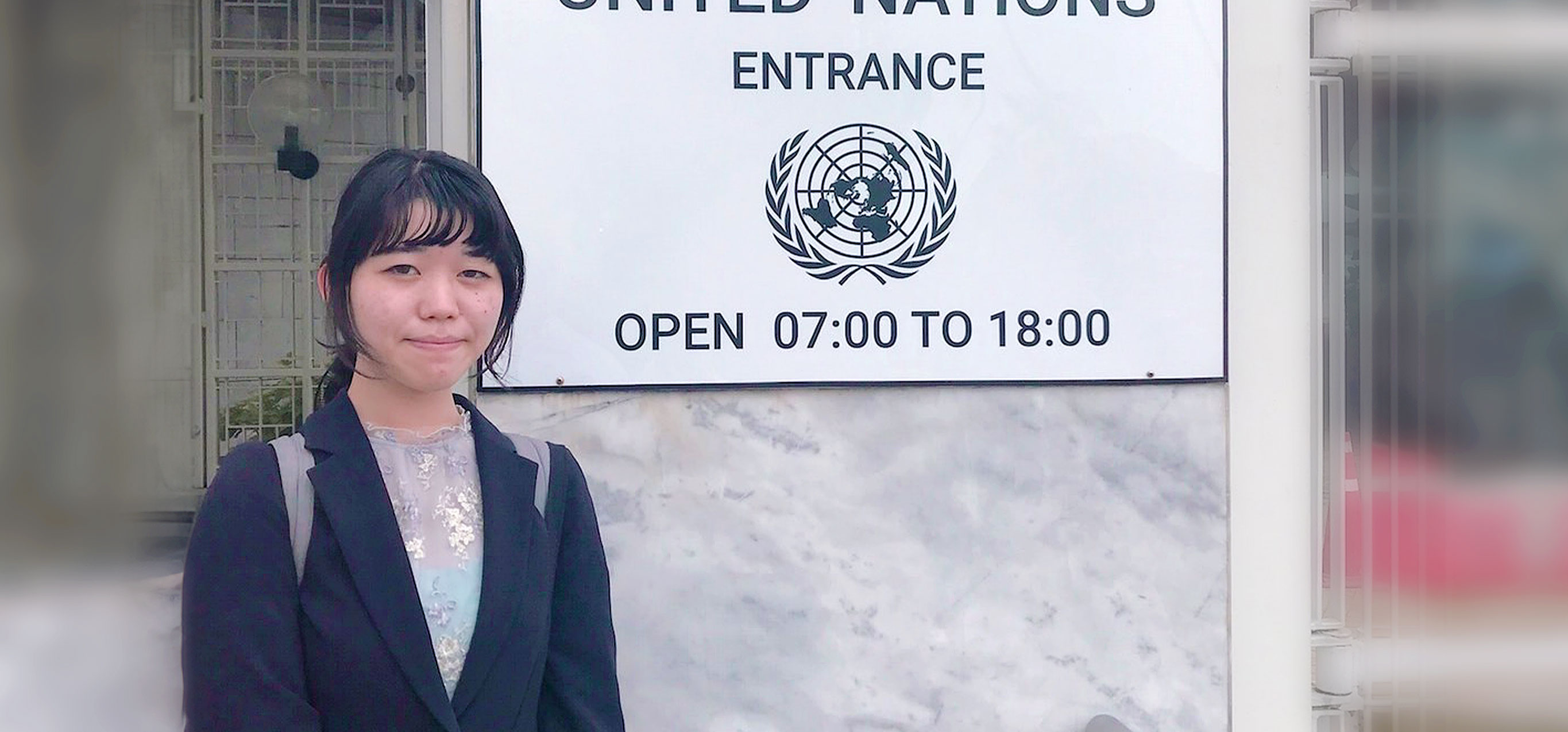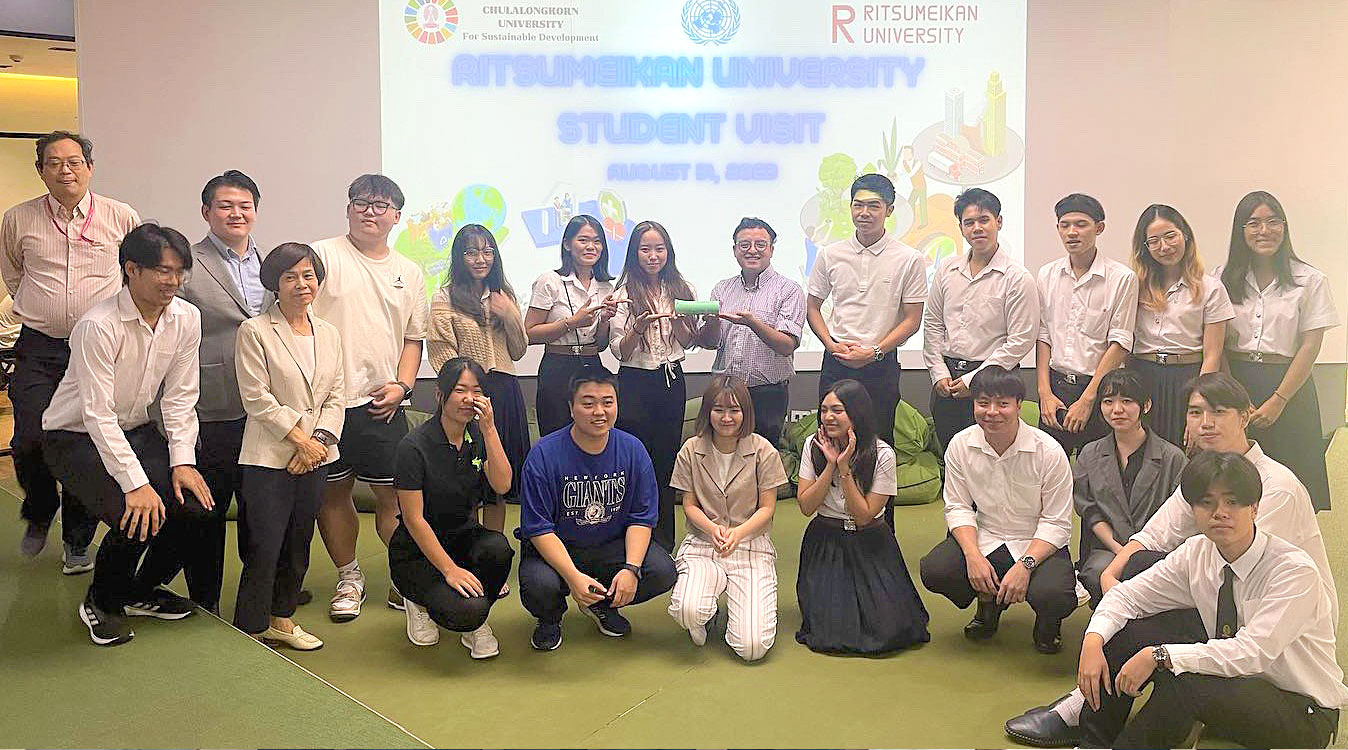
Through the training program in Thailand, I learned about the many issues facing the international community. The time spent was very valuable to me, as I was able to solidify in my mind “what type of experience I needed in order to prepare for my future.”
NAKANO Mai
Fourth-year International Relations Major
We interviewed a fourth-year student NAKANO Mai about her participation in the 'Thailand Bangkok Training Program', a new initiative that began in 2023. We asked her about what she learned, what she found memorable, and what she thinks about her future after having had this experience.
Please tell us what motivated you to participate in the 'Thailand Bangkok Training Program'.
MaiI am interested in working for an international organization and wanted to learn about possible career paths and how the members of organizations work together to solve international problems. Also, when it comes to international issues, I am interested in the subject of immigration. So, I wanted to participate in this program because it would provide me with a chance to visit the Bangkok office of the UNHCR (the United Nations High Commissioner for Refugees) and learn about the situation of the Rohingya people, their immigration situation, and the status of support for them.
Please tell us about some of the key things or highlights that you took away from the program.
MaiWhat struck me at the ESCAP (United Nations Economic and Social Commission for Asia and the Pacific) officials' briefing was that while it is important for the international community to establish an international framework, all officials emphasized the importance of partnership. Even if there are international agreements, those agreements are not legally binding. Therefore, as a UN official, I felt that strengthening partnerships with various actors in the public, private, and academic sectors is essential if one is to be effective in that role. I also learned a lot about the UN and possible career paths there, many of which were new to me.
The UNHCR briefing included tasks on understanding what it means to flee as a refugee and the realization that refugees face the harsh reality of having to live in an unfamiliar place in despair and anxiety. This is all while facing the fact that they cannot return to their home, even if they want. And I also learned about UNHCR's refugee protection and employment assistance over the past few years.
The UNHCR Bangkok Office has garbage bins for composting as well as for plastic and burnable garbage; they have achieved a drastic reduction in power consumption; and they encourage water bottles and mugs over the use of plastic bottles, etc. I was impressed by the organization-wide, environmentally friendly efforts of this actor, that is leading the way in the search for solutions to international issues.
What was surprising at the Ministry of Social Development and Human Security briefing was that Thailand is focusing on the gender gap, which is not small there, and is developing policies to battle the issue. They emphasized that, although women are making progress in society, there are still challenges when it comes to the field of politics. I found this interesting, as Japan is facing a similar issue. In this program, I learned of the existence of the Ministry of Social Development and Human Security (MSDHS). Although the Ministry of Health, Labor and Welfare would be considered the equivalent ministry in Japan, I had never had the opportunity to learn about the different classifications of administrative bodies. That is why I thought it would be interesting to compare the background and purpose surrounding the establishment of each ministry in Japan, as well as their decision-making processes.

MaiAt the Ministry of Foreign Affairs, I also learned about the importance of resilience when it comes to the environment, economy, and community; in particular, the need to focus on mental health when trying to improve personal resilience. I also learned that Thailand has taken on the role of coordinator of the ACSDSD (ASEAN Center for Sustainable Development Studies and Dialogue). This organization is responsible for promoting research and dialogue on sustainable development. Thailand has expressed its desire to develop as a logistics hub by promoting infrastructure development in the coming years. Hearing this has led me to believe that planned urban development will become even more important in the future.
While listening to speakers from the UN in the various sessions, I became aware of the importance and necessity of knowing one's position and expressing one's opinions when working for an international organization. While the Ministry of Foreign Affairs is required to prioritize national interests based on government guidelines, neutrality is essential for UN officials. Therefore, I felt the strong need to keep asking myself what legitimacy and fairness actually are.
Both Ritsumeikan students and Chulalongkorn students made presentations on SGDs at Chulalongkorn University. We discovered that Chulalongkorn University is also taking various approaches to SGDs, including the advocacy of various policies, environmental conservation activities, etc., which expanded my thinking regarding the possibilities of what a university can do. After the presentations, we had a group discussion about what the university and individuals can do about mental health care. In particular, our team discussed what can be done to prevent suicide due to depression and what kind of services it would be good to have at the university level. What struck me was that it is more common for students in Thailand to see psychiatrists than in Japan. Students casually visit psychiatrists if they are depressed, which made me feel a difference in awareness of mental health compared to Japan. In Japan, there still seems to be a perception that counseling is something to be ashamed of, or something signifying weakness. I felt that in countries such as Japan and Thailand, where the suicide rate is high, there is a need to make mental support and care more accessible.
Please tell us what you would recommend to other students about this program.
MaiI think that the most attractive point is that you can actually visit a global institution, see the people working there, experience the environment, and get a clear image of what it is like to work for an organization in an international capacity. Also, the idea of working for an international organization may sound far-fetched, but after speaking with UN officials, I was able to learn about their backgrounds and career paths, which was a very valuable experience and helped me solidify my thoughts regarding the experience I need in order to attain my future goals. I highly recommend that anyone who wants to work for an international organization or work on international issues participate in this program.
Could you explain how the experience you gained from this program would connect your future?
MaiIn my graduation research, I am studying the possibility of expanding Japan's acceptance of refugees from an employment perspective. Therefore, it was very meaningful for me to learn about refugee acceptance, protection, and employment support in Thailand through this program. In my research, I would like to look at the process of refugee resettlement in Thailand compared to Japan, as well as develop future possibilities for expanding refugee acceptance in Japan.
After participating in this program, I became acutely aware that, at this time, I do not have enough experience to work for the UN or another global institution. I intend to face and overcome this obstacle and gain the experience that I need.
March 2024
MORE INTERVIEWS
-
Bridging Japan and the US through International Relations and Language – My Four Years in the JDP and My Global Future
INADA Mimi
Fourth-year Joint Degree Program (RU-home)2025.2.25
studentlife|academics|studyabroad|jdp|
-
While technical knowledge and job-required skills can be learnt after being on the job, some skills, such as communication, presentation, data analysis, and visualization, are the skills I was able to learn from my time at Ritsumeikan.
Pranjal Modi
RIMOWA (Global Studies Major Alumnus 2022)2025.2.4
alumni|
-
Zemi Research Convention 2024“The Integration of Human Rights into International Environmental Law and its Implications”
Ochi Seminar
(team name: Environmental Justice Analysts)2025.1.6
academics|openseminar|
-
Zemi Research Convention 2024“Are Israel's actions in Palestine considered self-defence”
Ochi Seminar
(team name: The Prosecutors)2024.12.25
academics|openseminar|
-
This supportive community empowers you to step out of your comfort zone and take on numerous challenges throughout your university life.
SUZUKI Tomoya
SAP (International Relations Major Alumnus 2018)2024.12.11
alumni|
-
Surrounded by diversified nationalities of colleagues and external business relationships, this was essentially similar to what I experienced while studying in the College of International Relations.
Joyce Lo
Mindshare (Global Studies Major Alumnus 2017)2024.12.10
alumni|